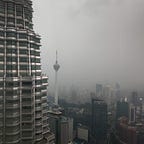Rethinking: UN, IMF & World Bank
The United Nations (UN), the International Monetary Fund (IMF) and the World Bank are international organisations we are familiar with. The latter two were created at the Bretton Woods Conference in 1944, while the UN in 1945, right after World War Two (WW2) ended. One established to maintain peace and security between nations. The IMF and World Bank are financial institutions tasked with creating a stable and prosperous world economy.
In theory, the existence of these organisations sounds noble, and their functions needed. In reality, they do some good but also commit harm, often unnoticed, but criticisms are growing. For too long, they operate with impunity. It is time to examine their internal structures and call into question their modus operandi and demand for accountability.
The articles below put forth the arguments:
The United Nations Has A Problem, and No One’s Talking About It — TRT Magazine
This piece summarised some of the problems plaguing the international body.
70 Years And Half A Trillion Dollars Later: What Has The UN Achieved? — Chris McGreal
Bureaucracy, high operating expenditures, political dramas, operation inefficiencies and cover-ups, McGreal examined the shortcomings of the UN as it celebrated its 70 years of existence,
They Put A Few Coins In Your Hands To Drop A Baby In You — Sabine Lee & Susan Bartels
The UN’s presence in Haiti was mired in controversy, from causing the Cholera outbreak to cases of sexual exploitation by its personnel. The researchers recorded the experiences of girls and women in communities that hosted peacekeeping missions, including stories of sexual abuse and exploitation.
Sexual Exploitation by UN Peacekeepers in DRC: Fatherless Children Speak for First Time about the Pain of being Abandoned — Kristin Wagner
Similar to Haiti, this piece is centred on the sexual abuse and exploitation faced by the women and children of the Democratic Republic of Congo by UN personnel. It focuses on the plight of abandoned mothers and fatherless children and how difficult it is to bring accountability to the perpetrators.
How the UN Caused a Massive Cholera Outbreak in Haiti — Armin Rosen
Haiti has not had a single case of Cholera since the mid-60s. When the UN mission came to aid the country due to the devasting earthquake in January 2010, it triggered an outbreak that killed and infected thousands of lives.
A Playground for the Colonial Forces: Unpacking the anti-UN protests in DR Congo — Sam Kniknie
After being in their country for over twenty (20) years, the Democratic Republic of Congo’s citizens is now protesting against UN Peacekeepers. According to Kniknie, the discontent is due to the organisation’s failure to understand the locals’ grievances.
Structural Adjustment: A Major Cause of Poverty — Anup Shah
Anup Shah unpacked the preconditions for financial aid imposed by the IMF and World bank and how loaned nations are kept impoverished. A comprehensive article with a well-supplemented list of works by other academics, economists and journalists well-versed on this issue.
The IMF’s Bottomless Bottom-Line Cruelty — Rob Larson
Developing countries are in perpetual poverty through the vicious Structural Adjustments Policies (SAPs) imposed by the IMF. Larson lists them out and discusses the growing opposition from nations suffering from these SAPs.
How the IMF is Pushing an Austerity-Based Recovery — Oxfam International
As the world’s economy recovers from the Covid-19 pandemic, low and middle-income countries dependable on IMF loans are forced into austerity. Oxfam International tracks IMF’s financing response and details them in this report.
Apartheid in the World Bank and IMF — Jason Hickel
Voting power at two international economic institutions is heavily skewed towards rich countries. Hickel argues this setup mirrors an apartheid system where developing countries have no voice to vote against harmful policies imposed on them.
At Your Own Risk: Reprisals against Critics of the World Bank Group Projects — Human Rights Watch (HRW)
Civil society groups and affected communities that opposed or voiced concerns about World Bank group-financed projects found little support from the institution on the threats they faced. The HRW details its investigation and recommends policies on what can be done.
Leaked Wikileaks Doc Reveals US Military Use of IMF and World Bank as ‘Unconventional’ Weapons — Whitney Webb
Documents released by Wikileaks reveal how US Military uses institutions like the IMF and World Bank (its financial power) as unconventional weapons in times of conflict and up to a large-scale war.
